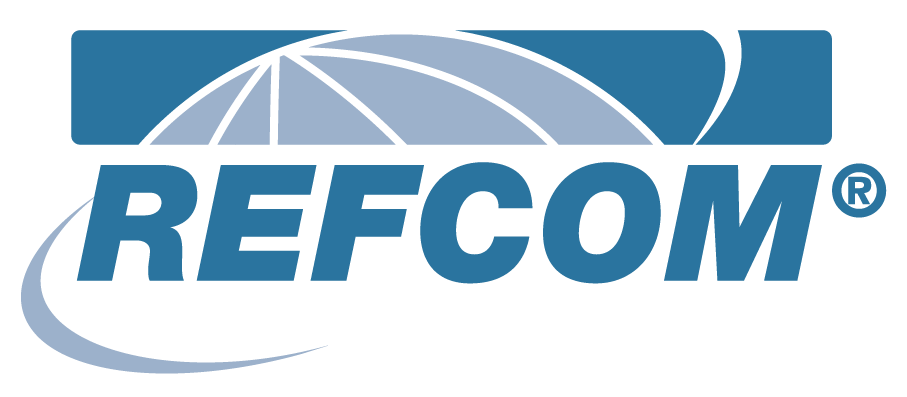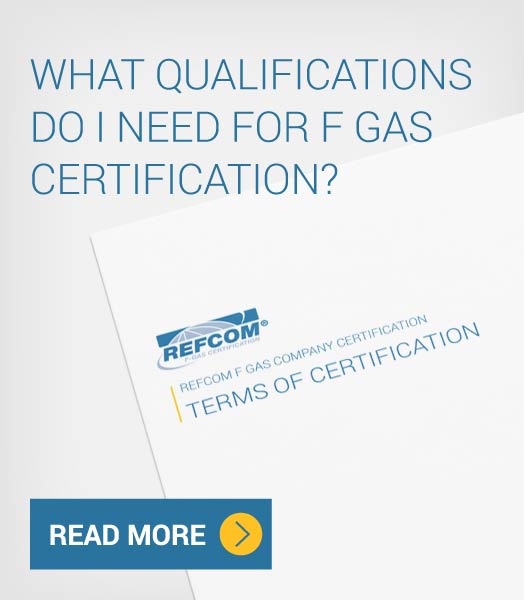FAQs: F-Gas certification
More detailed answers to any questions you might have on REFCOM F-Gas certification
F-gAS Regulations
Fluorinated gases have a high global warming effect if released into the atmosphere.
The principal objective of the EC Regulation is to contain, prevent and thereby reduce emissions of F gases covered by the Kyoto Protocol.
There are obligations in the F gas Regulation (EC517/2014) and the Ozone Regulation (EC Regulation 1005/2009) that affect many industry sectors. In some cases the obligations lie with the owner / operator of the equipment. In other situations the obligations lie with third parties, such as equipment suppliers, maintenance contractors and waste handling companies.
The following is a summary of uses and sectors affected. More details of the various obligations and a full listing of affected sectors is available from the Environment Agency.
Stationary Refrigeration and Air-conditioning - Users of these systems have numerous obligations to prevent leakage of F gas refrigerants. RAC systems using hydrochlorofluorocarbons (HCFC) refrigerants such as R22 need to address a ban on the use of this refrigerant which came into force January 1st 2015.
There are also many obligations that apply to RAC system suppliers and maintenance contractors, especially related to the use of appropriately qualified personnel and certification of companies.
Fire Protection - users of fire protection systems have many similar obligations related to leakage prevention and use of qualified personnel.
Mobile Air-Conditioning, Solvent Cleaning & Switchgear containing sulphur hexafluoride - the obligations for these sectors are more limited in scope mainly relating to proper recovery of gas during maintenance and at end of life.
Bans - A number of sectors are affected by bans on F gas usage, these include novelty aerosols, one component foam, magnesium die casting and non-refillable containers. See Defra guidance document IS26 – The Phase Down Programme.
Other sectors - Some sectors such as electronics manufacture, foam blowing and aluminium smelting have no specific obligations under the Regulations, but all users should be aware that emissions of F gases are very harmful to the environment and should be making all practical and economically feasible efforts to reduce emissions.
F gas legislation will very likely become part of the Montreal Protocol (probably in 2016) in order to speed up the phasing down of high GWP refrigerants following the Dubai Pathway Agreement (Feb 2016).
Commission Regulation 2015/2067 of 2 April 2008 sets out the requirements for a company certification scheme for businesses working with stationary refrigeration air-conditioning and heat pump equipment containing or designed to contain fluorinated greenhouse gases (F-Gases) in accordance with Article 10.7 of EC Regulations 517/2014 on certain fluorinated greenhouse gases (the EC F-Gas Regulation).
The Regulations apply to all sizes and types of business sole traders, partnerships, limited companies and public limited companies.
If your business carries out installation, maintenance or servicing of stationary refrigeration, air conditioning or heat pump equipment (SRACHP work) that contains or is designed to contain F gas refrigerants then you must obtain a stationary equipment qualification company certificate.
Businesses carrying out SRACHP work without one or other of these certificates will be committing an offence under The Fluorinated Greenhouse Gases Regulations 2014.
Contractors are now encouraged to inform customers and clients about the phase down of HFCs in order to make sure they can make an informed decision about which equipment to purchase. Contractors must keep the same records as the end user and records are to be kept for 5 years.
Full details can be found in Defra guidance documents IS 5 and IS 14, both available in our downloads section.
If your business employs sub-contractors to carry out SRACHP work then those sub-contractors must have a company certificate. You cannot apply for a certificate on their behalf.
Commission Regulation 2015/2067 defines installation as follows:
“installation” means joining two or more pieces of equipment or circuits containing or designed to contain fluorinated greenhouse gas refrigerant, with a view to assembling a system in the location where it will be operated, including the action by which refrigerant conductors of a system are joined together to complete a refrigerant circuit irrespective of the need to charge the system after assembly.
"Maintenance or servicing" means all activities, excluding recovery and checks for leakage, that entail breaking into the circuits containing or designed to contain fluorinated greenhouse gases, in particular supplying the system with fluorinated greenhouse gases, removing one or more pieces of circuit or equipment, re-assembling two or more pieces of circuit or equipment, as well as repairing leakages.
In the UK, the person having control of the equipment containing the F gas refrigerant (the “operator”), typically a company, is likely to have responsibility. Also, any business employing personnel involved in refrigerant handling must ensure that they have the appropriate qualifications.
The Environment Agency and devolved equivalents is the regulator for F-Gas legislation, and co-ordinates with local authorities and Trading Standards as necessary.
The Secretary of State for the Environment, Food and Rural Affairs and the Department of Environment have taken the decision to designate Refcom as a mandatory F gas company certification scheme that can issue stationary equipment qualification company certificates (full certificates) in GB and Northern Ireland.
It is important to note that decommissioning is defined separately to recovery. Recovery might be used as part of a maintenance process to allow replacement of a component before a system is returned to operation. Decommissioning is a specific process to allow the final shut-down and removal from operation of a piece of F gas equipment.
If your business is performing an SRAC decommissioning activity, you are required to have either a Category 1 or Category 2 qualification, depending upon the amount of gas in the system.
A Category 3 recovery qualification is not sufficient for the activity of decommissioning and cannot be used to obtain an F-Gas company certificate. F- Gas company certificates can only be issued to companies performing decommissioning activities who hold the appropriate number of Category 1/Category 2 and/or trained engineers.
Applying for F-gas certification
|
|
VALID FOR 3 Years
|
| Micro (sole trader) | £143.00 |
| Small (2-9 engineers) | £184.00 |
| Medium (10-49 engineers) | £372.00 |
| Large (50+ engineers) | £680.00 |
| Multi-site applications | POA |
All fees shown are subject to VAT at current rate.
Refcom Certification Ltd will not make a profit. Any surplus arising will be used to reduce fees in later years to further support the scheme.
Businesses must hold a stationary equipment qualification company certificate which will be valid for three years.
To apply for certification businesses will need to provide:
- Information about the business
- A list of employed engineers holding an appropriate stationary equipment qualification (City and Guilds 2079 categories 1-2 or equivalent) in handling F-Gases in sufficient number to cover the expected volume of activities
- Proof that engineers, or a majority of engineers, hold a City and Guilds 2079-11 or a City and Guilds 2079-12 qualification. Please note: City and Guilds 2079-13 or City and Guilds 2079-14 qualifications alone are not sufficient for a company certificate
- Proof that appropriate recovery systems and refrigerant handling procedures are in place and in use
Cat 3 or Cat 4 F-Gas qualifications are not sufficient for a company certificate. Company certificates can only be issued to companies whose engineers, or a majority of their engineers, hold a Cat 1 or Cat 2 qualification.
Applying through REFCOM is quick and easy. Find out more on our ‘how to apply’ page.
Provided you have the necessary information and documents to hand, for an average size SRACHP business the application process should take no more than five minutes.
For larger businesses, allow an extra two minutes to enter details for each additional employed engineer.
Online applicants will receive an automatic confirmation that the application and payment have been received.
Subject to satisfactory validation and verification, certificates will be emailed to you within 2-3 working days.
Businesses will be issued with a Stationary Equipment Qualification Company Certificate, which is valid for 3 years.
For REFCOM members F-Gas certification is an investment. Once a member, you can save £1000's each year through our exclusive member benefits.
If you have applied online for your F-Gas Company certification but have not yet received your certificate, don't worry. Provided you have met the certification standards, your business details will appear in the public listing on REFCOM's website with your registration number.
Businesses that hold a stationary equipment qualification company certificate (full) may be subject to either an annual desk-top or on-site risk based audit.
REFCOM Certification Ltd will annually select a percentage of certificated businesses to be inspected.
The audit model is detailed in the Certification Scheme Handbook.
Certificates are valid for three years from the date of issue but must be renewed on or before expiry.
REFCOM will let you know in good time when your certificate is due to expire.
Customers of businesses such as yours often find it reassuring to see visible proof of high professional standards. Logos can help you achieve this reassurance and REFCOM F-Gas Certification logos are now available for use on your company stationery and vehicles.
Logos for reproduction on printed materials are free of charge, van stickers are also available. For more information contact us.
If you hold a company certificate that has expired or is due to expire, you can renew online here. For businesses holding F-Gas certificates issued by another Certification Body simply apply for Company certification by clicking here.
Training and qualifications
For RAC personnel, the European Commission Regulation 2015/2067 refers to four different levels of certification, which allow personnel to carry out different activities. These are now described. Note that Category I covers all activities whereas the other three categories are more restrictive:
Category I certificate holders may carry out all refrigerant handling activities for any size of RAC systems containing HFC refrigerants. This includes leakage checking, refrigerant recovery, installation, maintenance and servicing.
Category II certificate holders may carry out refrigerant recovery, installation, maintenance and servicing, in relation to RAC systems containing less than 3kg of fluorinated greenhouse gases (or less than 6kg for systems that are hermetically sealed). Category II certificate holders may also carry out leak checks on any plant provided that it does not entail breaking into the refrigeration circuit containing fluorinated greenhouse gases.
Category III certificate holders may carry out refrigerant recovery in relation to RAC systems containing less than 3kg of fluorinated greenhouse gases (or less than 6kg for systems that are hermetically sealed).
Category IV certificate holders may carry out leak checks on any plant provided that it does not entail breaking into the refrigeration circuit containing fluorinated greenhouse gases.
Register or Renew Online
Simply click here to go to our secure online application



